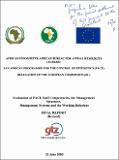Evaluation oF PACE Staff Competencies, the Management Structure, Management Systems and the Working Relations

(en=English; ar=Arabic; fr=French; pt=Portuguese)
Authors
African Union Inter-African Bureau for Animal Resources
AU-IBAR
Type
ReportItem Usage Stats
87
views
views
29
downloads
downloads
Abstract
Through the Organization of African Unity, now the African Union Inter-African Bureau
for Animal Resources (AU/IBAR) the European Union has funded a five year Euro 72
million programme to support the livestock sector in 30 Sub Saharan countries from
Mauritania in the west to the Horn of Africa in the east. Targeted is the control of
Epizootics coupled to animal productivity. At the end of the project in October 2004 due
to administrative and procedural delays few countries had completed their work plans
with a corresponding amount of funds unspent. Thus an extension of the programme
was granted up until February 2007 although the work programme had to be completed
by October 2006. An additional Euro 5 million was included in the package primarily to
fund the Project Coordinating Unit (PCU) whose role has been to coordinate and support
the programme in the 30 participating countries.
(ii) Rider No. 1 to the original financing agreement No. 6125/REG in granting the
extension included several pre conditions one of which was to carry out an independent
evaluation of the contribution of PACE to IBAR capacity building, including an
assessment of staff performance by December 31st 2004. Due to events on the ground
which delayed the in approval of PACE PCU work programmes this study has been
delayed and has now been carried out by an international and a local consultant
between the 6-20th May 2005.
(iii) Already the project is moving towards an exit strategy which influenced the
consultants thinking and deliberations. Serious staff changes if required at this stage
could perhaps only cause upheaval, destroy the corporate memory and result in more
problems than they were intended to resolve. In any event the already ambitious global
strategy till completion of PACE warrants the retention till at least mid 2006 of the
existing cadre with a phased lay off to follow. Retiring work plans and cost estimates and
closing the programme across 30 countries will require a major effort particularly from
the finance staff and we were able to quickly agree that additional qualified staff were
urgently needed. To help prepare AU/IBAR absorb the lessons and the knowledge of
PACE and in particular transmit to the participating countries the need for continued
vigilance and follow up after the conclusion of the PACE programme warrants in the
consultants opinion an additional staff member attached to the proposed Information and
Communications Unit.
(iv) Whilst much of the benefits of PACE are identified at country level the PCU had a
crucial role to play in the coordination of the programme and the technical support to
national coordinators to follow the purpose and designated activities of the programme.
Relationships could not be described as amicable between the professional staff during
the early years of the PCU. Neither was the relationship between the donor, the EC and
the RAO and PACE management. We hastily wish to add that most of these problems
appear now to have been resolved and there is now a platform for mutual respect in
place. It is opportune to note at this point that a second obligation of the rider, that of
AU/IBAR absorbing two professional PACE staff members onto its permanent
establishment, is now underway with the question of accompanying operational costs
under discussion. The contribution that PACE has made to IBAR understanding of the
needs and aspirations of the 30 countries is immense. The absorption of these two
professional will strengthen the cord through which further technical information will flow
to AU/IBAR before the conclusion of PACE.
Collections
- PACE Documents & Reports [158]